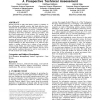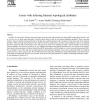101 search results - page 6 / 21 » Why collective inference improves relational classification |
KDD
2003
ACM
16 years 23 days ago
2003
ACM
Recent proposals to apply data mining systems to problems in law enforcement, national security, and fraud detection have attracted both media attention and technical critiques of...
96
Voted
JUCS
2008
15 years 9 days ago
2008
: We address the problems of structuring and annotation of layout-oriented documents. We model the annotation problems as the collective classification on graph-like structures wit...
COMCOM
2004
15 years 6 days ago
2004
A number of recent studies of Internet network structure are based on data collected from inter-domain BGP routing tables and tools, such as traceroute, to probe end-to-end paths....
JCIT
2008
15 years 10 days ago
2008
Automatic speech recognition by machine is one of the most efficient methods for man-machine communications. Because speech waveform is nonlinear and variant. Speech recognition r...
ICDM
2008
IEEE
15 years 6 months ago
2008
IEEE
Recent research has shown that collective classification in relational data often exhibit significant performance gains over conventional approaches that classify instances indi...



